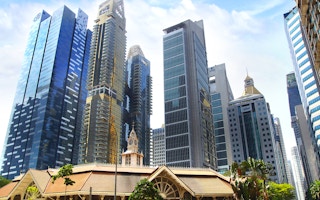Our world is changing. Over twelve months have passed since the signing of the Paris agreement on climate change. In that time, average temperatures have risen to 1.2C above that which they were before the industrial revolution, putting 2016 on course to be the hottest year since records began.
Amid this warming landscape, a wave of populism and nationalism has gradually spread around the globe, increasing concern amongst many that basic values of humanity and environmental stewardship will fall victim to demagoguery.
In this era of renewed uncertainty, of this period of anti-politics in the face of shifts in technology and patterns of migration, there is a high risk that the mistakes of the past will be repeated. But to borrow some poetry from the late Leonard Cohen, whilst there is indeed a crack in everything, that’s how the light gets in.
For this is an age, lest we forget, of unprecedented opportunity where so many of us are empowered to influence social and environmental outcomes through our own choices. Where businesses and investors – small and large – increasingly understand that values in fact matter in order to build trust with each other.
That their decisions shape the future. And more and more of them, and us, realize that we have an opportunity to lead through action.
I have watched a movement grow. Indeed, this silent revolution from within markets has been stirring for the best part of two decades, promising to redirect entrepreneurial energies towards cleaner, greener, and more inclusive societies.
And it is now speeding up. There is a march underway, not in one place but from all corners of the earth. Of individuals from all walks of life, old and young and from diverse religious and cultural backgrounds, who are all searching for new ways to conduct everyday business. To conduct life.
They share a common vision that ethics based on universal principles of humanity, social inclusion, and environmental stewardship are not in conflict with economic value creation. They are collectively the custodians of tomorrow – as we all are – who understand the power of sustainability to create positive change. They are “Generation S”.
The term, whilst new, can be recognized through guises such as “corporate responsibility” or “sustainable investment”. The seeds for Generation S were first planted in the late 1990’s when former UN Secretary General Kofi Annan initiated a “Global Compact of shared values to give a human face to markets”.
The movement rapidly evolved. Initially, in 2000, only 47 companies took a stand on basic universal principles in the areas of human rights, labor issues, environmental stewardship and anti-corruption. But today, over 9,000 companies in over 160 countries now strive towards the full implementation of these principles, which are supported by many other initiatives pursuing similar goals.
It is a collective that is here to stay, for ultimately it is driven by long-term trends that are irreversible, irrespective of political mood swings.
“
What the X-Ray did to medicine, ESG is now doing to the financial world.
Firstly, technological change and the irreversible rise of transparency both put a premium on good ethics and values. If you get data to the people, you empower the people.
Secondly, the scientific certainty of natural boundaries makes it clear that resource efficiency and low carbon solutions defines future competitiveness.
And thirdly, there are individuals now everywhere, especially millennials, who expect business to part of the solution rather than part of the problem.
Financial markets were initially slow to realize that the framework conditions for long-term success had changed. At the Global Compact in 2004, we published a report entitled “Who Cares Wins” which suggested that environmental, social and governance (ESG) issues should become part of investment analysis and decision making.
Few investors paid attention. But a mere two years later, the Principles for Responsible Investment (PRI) initiative was launched, with a founding network of investors pledging to consider ESG issues in their decision making. The organization now has over 1,500 participants, representing over $60 USD trillion in assets under management. A new level of dynamics has settled in.
Even twenty years ago, there were no standards and very few guidelines on how to account for environmental, social and governance factors. Air pollution, water consumption, child labor, bribery and corruption simply didn’t show up in corporate disclosures.
But driven by initiatives such as the Global Reporting Initiative, the International Reporting Council and the Sustainability Accounting Standards Board, a robust data ESG infrastructure is now emerging. And whilst it is still imperfect in many ways, this infrastructure allows us to take into account core issues such as human rights, carbon intensity and transparency at an unprecedented level.
According to the New York-based Global Initiative for Sustainability Rating (GISR), there are currently over 120 rating organizations offering over 500 products. Disclosure requirements in many countries – such as the EU directive on ESG disclosure, and the changing of listing requirements of stock exchanges across the globe – 12 exchanges now require listed companies to disclose relevant ESG information - will undoubtedly drive this forward even more.
It is nothing short of a data revolution, and it brings with it increasing evidence that companies which outperform on relevant ESG issues deliver better financial results. Ultimately, debunking the myth that sustainable investment comes at a cost to returns in the pocket.
“
Look around you, and you may start to notice that there are in fact more than a few people who are part of a new group. Against the odds, they can make the future.
This data revolution and the possibility of quantifying ESG means that investors can now become a driving force of positive change. As evidence mounts that good returns and good ESG performance go hand in hand, we may well see that sustainable investment will become a mega catalyst.
What the X-Ray did to medicine, ESG is now doing to the financial world. It allows investors to assess corporate DNA like never before, and to ensure that capital goes to companies which are future fit.
So the future is now set for investors to place a premium on those companies which treat their workers well, which understand their impact on the environment and the communities around them, and which are run opaquely. And with this future comes the potential to greatly accelerate positive, sustainable change.
To reduce emissions so harmful to our world, and to build social capital with those people who feel left behind and indeed threatened by change.
The doors are now open for a massive market-led shift, and Generation S has the opportunity to be the first to step through and shape the future. But to succeed, more business executives need to take on real leadership roles; markets require a new type of corporate statesmanship that earns a license to lead.
More investors now need to get serious with the integration of ESG issues into their analysis and decision-making across all investment classes. And above all, individual people – all of us - are now the decision makers. We can be the positive protagonists.
Of course, it will not be easy. Generation S is not yet a decision-making majority. Public policies are currently divisive and play on fear. They divide us rather than build on what connects us. The old paradigm of the industrialization era is still a formidable force.
Too many people still believe that more is better, irrespective of consequences for others. Too many people still hold on to the belief that dumping pollution in the atmosphere has no consequences and that labor is a disposable commodity. Indeed, there is little regard for a shared responsibility for the future, and critical issues such as climate change and greater equality are falling through the gaps.
Fear and old ideologies pose formidable barriers. But, bottom up changes spurred by technology and universal values of humanity will increasingly shape the future. Generation S can be a global movement. Power can be with the people. And quietly, their numbers are growing by the day across all continents.
They speak many languages, with stories and backgrounds that are very different. They share a common sense of basic respect for each other and for our planet, and increasingly are finding entrepreneurial solutions to help meet the needs of our resource-constrained and unequal societies so desperately need.
They know that old models of industrialization are fast giving way to smarter and cleaner forms of value creation. They do not fear the future or technology because they understand that technology can be harnessed to deliver the future we want, for the benefit of more.
Yes, the world has changed in 2016, and there are cracks. But look around you, and you may start to notice that there are in fact more than a few people who are part of a new group. Against the odds, they can make the future. And whilst they are not yet a majority, through their actions, they can become the biggest drivers of change.
They are the light. The question is, are you in?
Georg Kell is the Chairman of Arabesque and the Founding Director of the United Nations Global Compact.


















